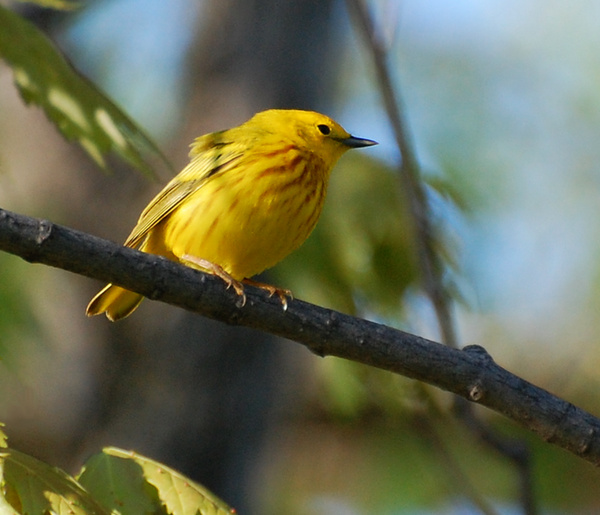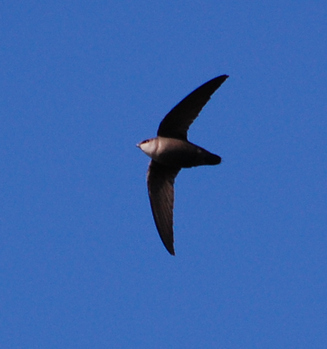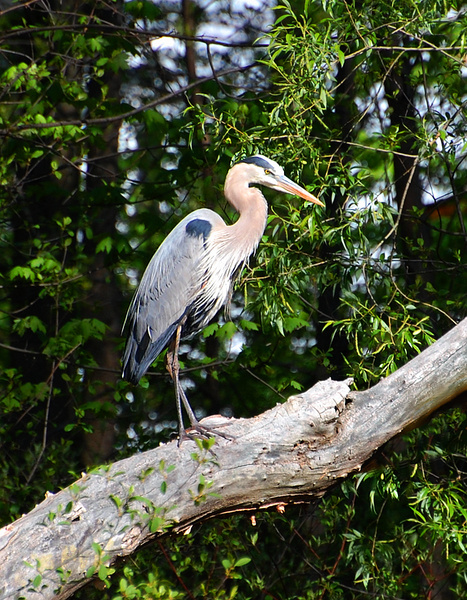
Mud Lake, May 10th
May 12th, 2010
As the early nesters bear, raise, and even fledge their young, other species are only just beginning. The next big wave of spring migration has hit.
Baltimore Orioles are back--three flame orange males at various locations around Mud Lake, all of them camera shy. American Redstarts are back and singing. Cedar Waxwings have returned from wherever they wandered to last winter (it's variable), and are now present in flocks throughout the BCA. Catbird songs emanate from every other bushy thicket. And Warbling Vireos and Yellow Warblers are singing their little hearts out.

1680x1050 wallpaper
On Tuesday afternoon, insect swarms by the Ottawa River attracted an impressive mixed flock of literally hundreds of swallows and swifts, whizzing through the air at high speed as they snapped up whatever they could. I love swallow-watching, though I don't usually attempt it with a camera--they just move too fast. I guess I was a glutton for punishment that day, because I tried it anyhow. I was rewarded with a surprisingly well-focused shot of a Chimney Swift.

Swifts are the most aerial class of birds in the world--and Chimney Swifts are no exception. Unless they have young to tend, they spend literally the entire day in the air. They are incapable of perching. They're common birds, but unless you find a nest/roost site inside a chimney or hollow tree (where they cling to vertical surfaces), the only way you'll ever see them is in flight. Swifts remind me of bats--their strange nesting habits, their irregular, fluttery flight--but they're birds, most closely related to the hummingbird family.
Trivia point: authentic Bird's Nest Soup is made from the saliva of Cave Swiftlets. As if they weren't batlike enough, some cave swifts use echolocation to find their nests in the dark.
All three of Mud Lake's breeding herons (Great Blue, Green, Black-Crowned Night) are back on territory. Great Blues have been back for awhile, but this one on Tuesday was my first of the year.

I've seen little variety of migrant warblers so far this year--haven't been out at the right times and places, I guess. That's fine, since tomorrow I'm off to Point Pelee, migrant warbler capital of the world!
May 12th, 2010
As the early nesters bear, raise, and even fledge their young, other species are only just beginning. The next big wave of spring migration has hit.
Baltimore Orioles are back--three flame orange males at various locations around Mud Lake, all of them camera shy. American Redstarts are back and singing. Cedar Waxwings have returned from wherever they wandered to last winter (it's variable), and are now present in flocks throughout the BCA. Catbird songs emanate from every other bushy thicket. And Warbling Vireos and Yellow Warblers are singing their little hearts out.

1680x1050 wallpaper
On Tuesday afternoon, insect swarms by the Ottawa River attracted an impressive mixed flock of literally hundreds of swallows and swifts, whizzing through the air at high speed as they snapped up whatever they could. I love swallow-watching, though I don't usually attempt it with a camera--they just move too fast. I guess I was a glutton for punishment that day, because I tried it anyhow. I was rewarded with a surprisingly well-focused shot of a Chimney Swift.

Swifts are the most aerial class of birds in the world--and Chimney Swifts are no exception. Unless they have young to tend, they spend literally the entire day in the air. They are incapable of perching. They're common birds, but unless you find a nest/roost site inside a chimney or hollow tree (where they cling to vertical surfaces), the only way you'll ever see them is in flight. Swifts remind me of bats--their strange nesting habits, their irregular, fluttery flight--but they're birds, most closely related to the hummingbird family.
Trivia point: authentic Bird's Nest Soup is made from the saliva of Cave Swiftlets. As if they weren't batlike enough, some cave swifts use echolocation to find their nests in the dark.
All three of Mud Lake's breeding herons (Great Blue, Green, Black-Crowned Night) are back on territory. Great Blues have been back for awhile, but this one on Tuesday was my first of the year.

I've seen little variety of migrant warblers so far this year--haven't been out at the right times and places, I guess. That's fine, since tomorrow I'm off to Point Pelee, migrant warbler capital of the world!
| ← | → |
